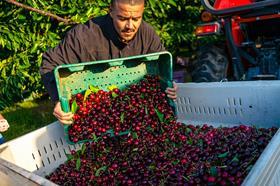
The latest development in a rolling trade dispute between the US and China features a recognition of impact and US$12bn in relief funding from the United States Department of Agriculture (USDA) to US farmers.
The short-term relief funding will be distributed through a number of programmes like direct payments to farmers, commodity purchases for food-aid programmes, and increased promotion to other export markets looking for US products, according to Bloomberg.
“This is a short-term solution to allow president Trump time to work on long-term trade deals to benefit agriculture and the entire U.S. economy,” said US secretary of agriculture, Sonny Perdue, in a statement.
Mark Powers, director of the Northwest Horticultural Council told Asiafruit, “The tariffs imposed by the People’s Republic of China (40 percent on apples, pears and cherries) and Mexico (20 percent on apples) plus the 25 percent tariff on apples India has indicated it will impose August 4 of this year will affect $500 million of export volume.”
The US$12bn in relief funding was calculated based on a predicted US$11bn impact that retaliatory tariffs will have on the entire agricultural economy, from fresh fruit to soy and grain.
“Unfortunately, America’s hard-working agricultural producers have been treated unfairly by China’s illegal trading practices and have taken a disproportionate hit when it comes illegal retaliatory tariffs,” said Perdue.
Despite his comment, China’s multiple retaliations to president Donald Trump’s implemented tariffs have been in line with World Trade Organisation (WTO) regulations.
The USDA stated the short-term relief strategy will be in place while the Administration works on “free, fair, and reciprocal trade deals to open more markets in the long run.”
Senator Ron Johnson, a Republican from Wisconsin told Bloomberg her thoughts were in line with farmers, who “want trade, not aid.”
Powers said “the impacts of the retaliatory tariffs continue to mount and there does not appear to be a change on the horizon.”



